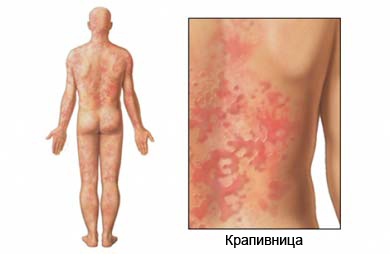Hives
Description urticaria
Hives – small, itchy, red swelling on the skin. Swelling occur singly or in groups. Hives tend to fade after a few hours, but again, you may receive. Most cases of urticaria lasts for several days, but in some cases the symptoms can be observed for several weeks or longer.

The causes of hives
Hives often, when the body releases a chemical called histamine. Histamine is released during allergic reactions. Many people, However, suffer hives, without being exposed to allergens.
Although the cause of the urticaria is not known, in some cases, hives can cause various factors:
- Products, common:
- Eggs;
- Clams;
- Peanuts;
- Chocolate;
- Fish;
- Tomatoes;
- Fresh berries;
- Milk;
- Medicines;
- Reaction to allergy shots (desensitization);
- Infection;
- Insect bites;
- Latex;
- Pressure;
- Cold or heat;
- Sunlight;
- Thyroid disease (gipotireoz, hyperthyroidism);
- Pollen;
- Stress;
- Vasculitis (inflammation of blood vessels).
Risk factors for urticaria
Risk factors increase the probability of occurrence of hives. Tell your doctor, if you have the following:
- The response to exposure to allergens (substances, which cause allergic reactions);
- The response to exposure to allergens, that triggered hives in the past.
Symptoms of hives
Symptoms of hives can vary from mild to severe:
- Itch;
- Redness;
- Edema;
- Excessive swelling of the eyelids, mouth or genitals;
- Feeling the heat;
- Burning;
- Difficulty breathing or swallowing – if you have any of these symptoms, immediately seek medical advice.
Diagnosis of urticaria
The doctor will ask about your symptoms and medical history and a physical exam. Maybe, you have to see a doctor, who specializes in skin diseases (dermatologist) or allergy (allergist). There will be the following tests:
- Injection each sample – a small amount of allergen is injected into the skin using a needle, to see the presence of an allergic reaction;
- Skin biopsy – removed a small piece of skin;
- Roentgen – test, which uses X-rays, to take a picture of structures inside the body, especially bones;
- Blood tests.
Treatment urticaria
The best way to treat hives – find and avoid the causes of its occurrence.
If the cause can not be found, there are medications, allowing to reduce the symptoms and cure hives:
- H1-blocking drugs, such as:
- Dimedrol;
- Gidroksizin;
- Fexofenadine;
- Loratadine;
- Acrivastine;
- Cetirizine;
- Doxepin;
- Levocetirizine;
- H2 blocking drugs, such as:
- Cimetidine;
- Ranitidine;
- Famotidin;
- Leukotriene Antagonists, Taki how montelukast;
- Oral steroids (eg, prednisolone) for hives, resistant to other therapies;
- Anti-inflammatory drugs;
- Immunosuppressive;
- Therapy with ultraviolet light;
- Injections of epinephrine (adrenaline) for cases, when swelling occurs in the airways.
Prevention urticaria
The best way to prevent hives – avoid contact with allergens, which causes it.
